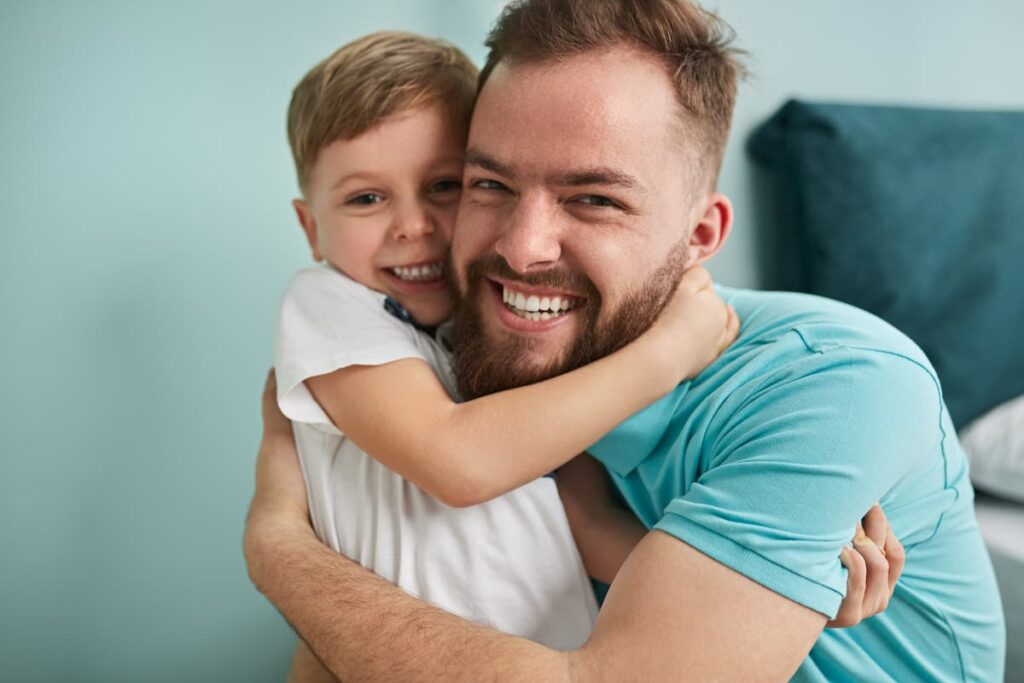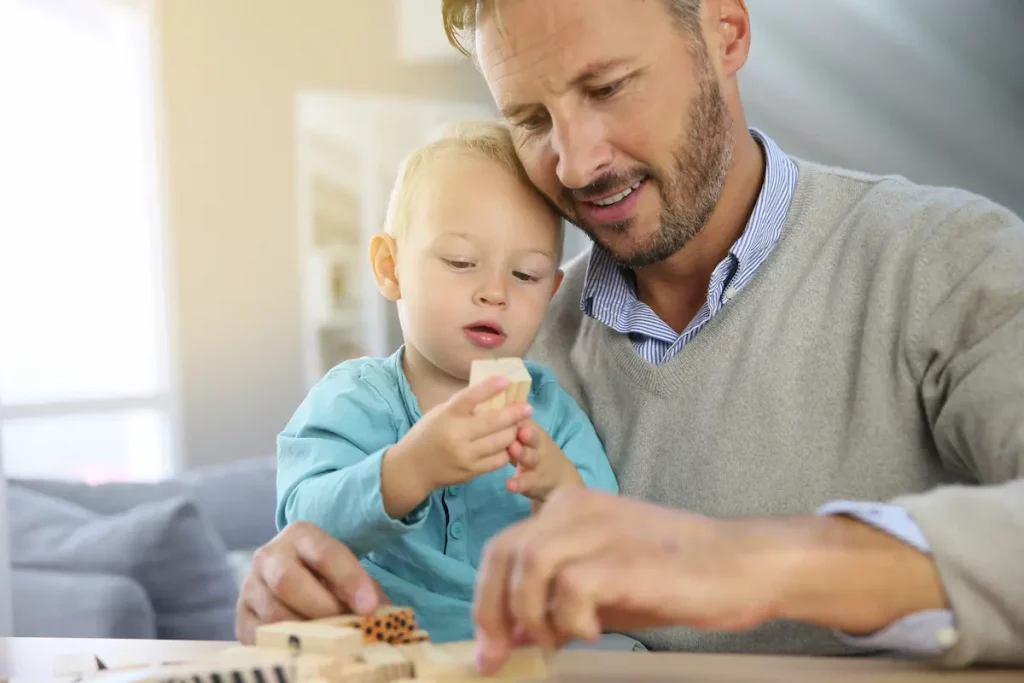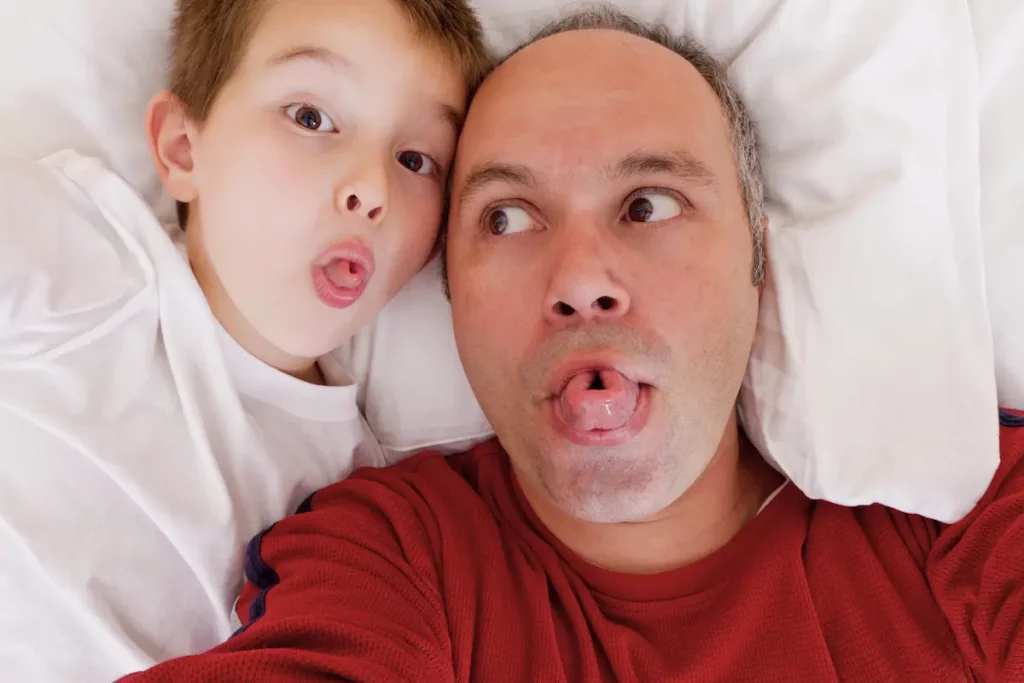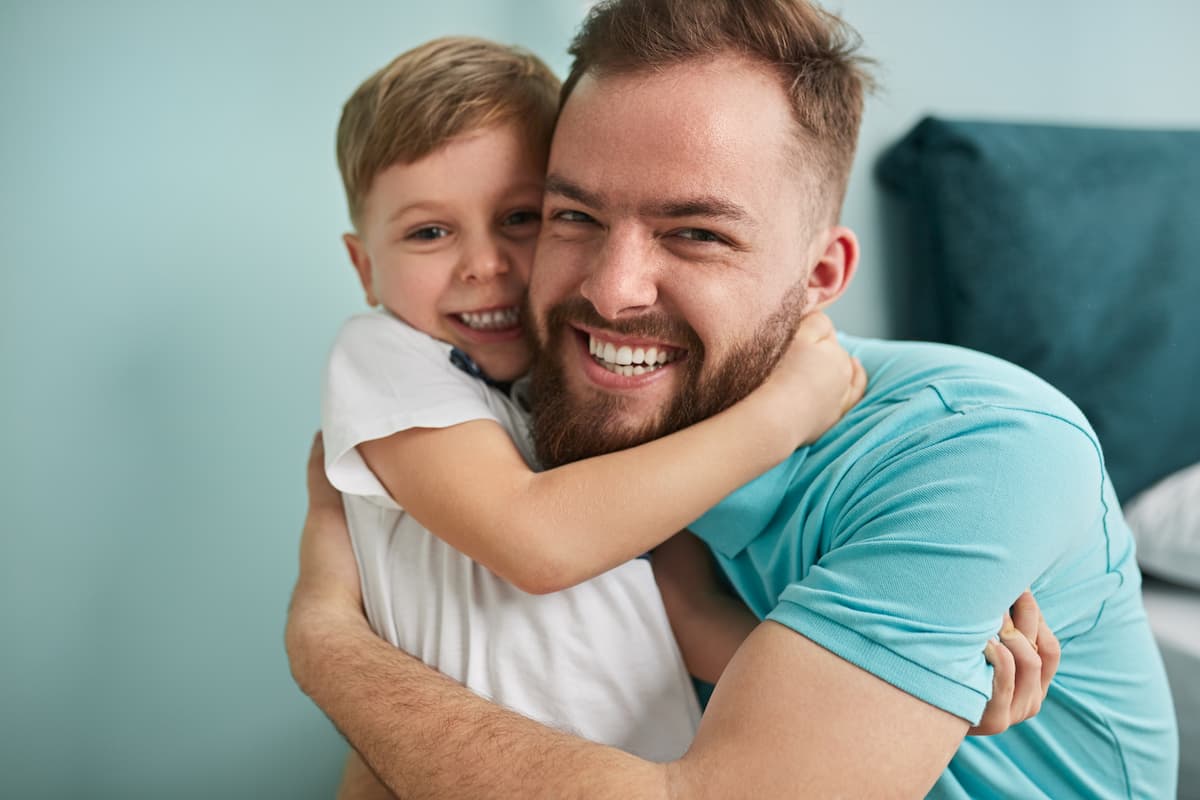The first three months of a child’s life are known as the 4th trimester, and a father cuddling a newborn during this stage helps to replicate the environment they experienced inside their mother’s womb. Cuddling is highly recommended from an early age, but when should a father stop cuddling with his son?
A father should stop cuddling with their son only when it becomes uncomfortable for either party or when the son expresses that the cuddling needs to stop. Cuddling a child from a young age holds many benefits for both the parent and child and should be encouraged for as long as possible.
Babies not fortunate enough to have a cuddling father or mother have lower levels of vasopressin and oxytocin. These two hormones play a vital role in social behaviors and stress management and are one of the reasons that these children struggle to make attachments when they are adults.

When Should A Father Stop Cuddling With His Son
A father cuddling with his son is a beautiful intimate sight and a healthy way of showing affection. The significance of cuddling your child cannot be overstated. Cuddles and hugging have various benefits for humans, but it is especially vital in child development.
A father should stop hugging their son when either party becomes uncomfortable with the act or when the son specifically requests him to stop, usually when puberty starts. An article published in the London Economic suggests that 1-in-10 dads stop hugging their sons at ten years of age, with 6-out-of-10 dads stopping when their son turns fourteen.
Fifteen percent of those polled said they stopped cuddling their sons before they turned five. There’s no universal agreed-upon age limit where you should stop cuddling with your son, but the benefits of cuddling outweigh any social pressure to stop, so cuddle away!
Why A Father Should Cuddle With His Son
For most fathers, cuddling their sons is one of the most natural things. And long may it continue, as cuddling a child from an early age (straight out of the womb) helps the child to form a bond with their parents, which can have positive effects later on in their lives, and early development stages.
The child’s self-confidence, expression of individualism and empathy, social relationships, and ability to cope with life’s stresses are some of the areas that can be positively affected. A simple cuddle shows love, affection, understanding, support, and how proud you are of your child. Cuddles and hugs promote health!
Let’s look into the various benefits of why parents should cuddle and hug their children, for as long as possible, from the day that they are born:
Cuddling Helps To Form A Bond With Your Child
Hugs are an extremely important way for parents and their children to bond, and hugs from parents induce rapid and observable physiological changes in their children.
A study published in iScience found that a hug from a parent lowers the child’s heart rate, which leads to a calmer child, and a baby could differentiate between being held by a stranger and their parent. Babies love being cuddled by their parents.

Cuddling Releases Oxytocin
Oxytocin, the cuddle hormone, has been linked to social bonding and is one of the reasons we feel fuzzy, warm, and happy inside when cuddled. Oxytocin promotes feelings of trust, affection, and bonding, laying the biological cornerstone to be able to connect with other people.
A dad and son cuddling benefits both parties, laying the foundation of a lifelong connection. Oxytocin decreases fear and increases one’s ability to accept risk, ultimately leading to a willingness to trust others. It also leads to increasing a child’s attachment security.
Cuddling Reduces Stress
When humans cuddle, the amount of cortisol immediately decreases in our bodies. Cortisol is the stress hormone that works closely with your brain regarding “flight or fight” responses. Cuddling sends calming messages to our overworked brains helping to relieve and release tension.
Cuddling Helps Develop Children’s Brains
When children are young, they require lots of sensory stimulation to ensure that they develop a healthy brain and a powerful body. Physical touch, cuddling, and hugging are some of the most important ways to stimulate normal development.
Infants in orphanages who are not cuddled, hugged, or receive minimal human touch and interactions, often struggle with delayed motor skills and cognitive development, according to a study published by Dr. Seth Pollak from the University of Wisconsin.

Cuddling Helps To Regulate Emotions
Cuddling an emotionally out-of-control emotional toddler is the best way to stop a tantrum tsunami in its tracks. Many parents believe that cuddling a child mid-tantrum is rewarding bad behavior, but it turns out it’s quite the opposite.
If you cuddle your child without giving in to their demands is helping them to learn how to self-regulate their out-of-control emotions. Our emotions are regulated by two separate mechanisms in our nervous system:
- Arousal Branch
- Calming Branch
The arousal branch speeds up our emotions, while the calming branch stops the emotion from running out of control or gaining dangerous momentum. When the two are working together, it can be seen as a gas and brake pedal that helps to regulate our emotions.
When the emotional arousal branch is overactive, and the calming branch is inactive, as found in children, the result is often an emotionally powered runaway car without brakes. A cuddle can stop the emotional crash from happening or gaining speed. Cuddling a child helps them to actively start using their calming branch, thereby regulating their emotions.
Cuddling Makes Children Happy
For those unfortunate to have never cuddled a child, you don’t know what you are missing. It’s one of the rare experiences where you can see a person experience happiness on their face. Want to turn a frown upside down? Cuddling is the answer.
Cuddling and hugs are known to increase a person’s psychological resources, such as self-esteem, optimism, and mastery. These psychological resources buffer stressful life events, and cuddling enhances them, making the recipient feel loved and happy when oxytocin is released.
Related Reading: The Best Father Son Videos Games to Play Together
Cuddling Has Many Benefits
Ask any nurse who works at a newborn or infant care unit at a Children’s Hospital about the health benefits of human touch on premature babies, newborns, and children in general, and you will get a list as an answer, like the following:
- Lowers Anxiety
- Lowers Stress
- Improves Sleep Patterns
- Encourages Calmness
- Encourages Relaxation
- Creates Healthy Personal Boundaries
- Improves Muscle Tone
- Improves Circulation
- Improves Immune Functions
- Reduces Emotional Stress
- Reduces Teething Discomfort
- Reduces Congestion Discomfort
- Reduces Colic Discomfort
- Strengthens Circulatory Systems
- Strengthens Digestive Systems
- Strengthens Gastrointestinal Systems

How To Deal With People Who Judge The Act Of Cuddling?
Unfortunately, we live in a world where people tend to judge each other, don’t mind their own business, and are quick to pass that judgment on without regard to others’ feelings.
As a father, you might be lucky enough to cuddle your son for many years, but it could translate to people “frowning” on the cuddling act, sharing that they find it “weird” if it’s happening past a certain age.
After reading through the numerous benefits listed in the article above, the best advice is to not even engage with these narrow-minded people (who could probably benefit from a cuddling session themselves) and remember that cuddling is healthy and allowed until your child decides otherwise.
The world needs more cuddles and hugs, so be grateful that you can cuddle your child and do it for as long as possible.
Final Thoughts
The act of cuddling, hugging, and making physical contact with others are well-known methods to show affection, emotional support, understanding, and most importantly, love. Cuddling with your child is encouraged, supported by science, and helps build an emotional and physical bond between father and son.

